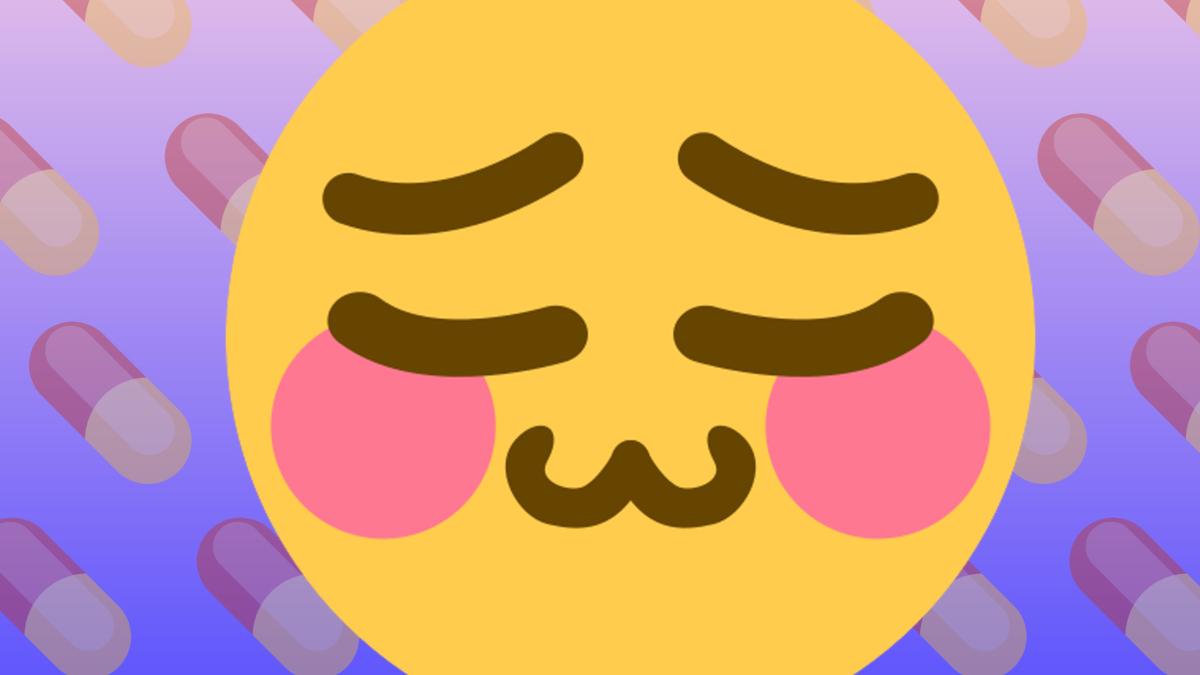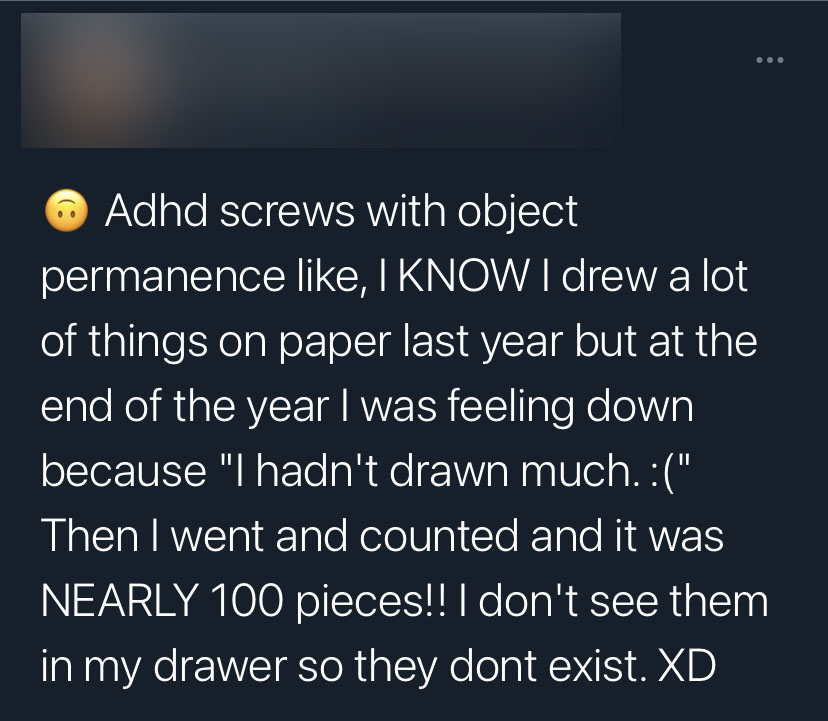
ADHD loudmouth. ADHD advocate. ADHD comic. ADHD bisexual. ADHD ceramicist. ADHD warrior. As a I scroll through Twitter I start to wonder: at what point did ADHD become a kind of class designation, in the same vein as rogue, mage, or paladin? [Editor’s note: those are World of Warcraft fighter types.] Scanning through a collection of viral ADHD tweets, the word you see again and again is “traits”, one ripped straight from a Baldur’s Gate GAMEfaq, being used to discuss a serious disorder in the same way the CRPG nerds of my halcyon youth discussed Kobolds. [Editor’s note: we’re still talking games here.] The language of dissection, stats, combat, and worth.
The image of the ‘ADHD poster’ being a Tumblr expat with a Steven Universe display pic and a DSM contents page in their bio is a prevailing archetype on Twitter for good reason. Twitter, with its shallow discourse, easy outrage, and boom and bust cycles of vitality is a platform seemingly reverse engineered to attract and entrap those diagnosed with ADHD, and to make those who aren’t feel like they should be.
It is also a website with fleeting moments of uncommon intimacy, one which sustains itself on found communities, family, and friendships.
It was on Twitter that I came to terms with my ADHD diagnosis in 2017. As someone diagnosed with autism, bipolar 2, depression, OCD, and all their buddies, I saw my ADHD diagnosis as a bit of a well, duh moment. Still, it provided me a new way of tackling the debilitating “traits” bouncing around in my mind, as well as a new amphetamine dependancy, thanks to the heart pounding splendour of my Vyvanse prescription (you know something’s up when 60mg of slow release amphetamines a day calms you down).
So trust me when I say that I am a proud “neurodivergent”, even if the label makes me feel like I’m being hunted by Bladerunners for being too obsessed with Evel Knievel or some such.
Years of dodgy psychiatrists, harmful medication, and piss-poor healthcare has taught me to treat an official diagnosis as a part of a process as opposed to definitive beginning or end point for treating myself, or understanding who I am. There is a temptation (one that I have succumbed to in the past) to carve your diagnosis into your identity like Nightcrawler, and to use it as a punch card that explains and manages your foibles, failures, and fuck ups to people in your past, present, and future.
Combine that temptation with late capitalism’s insistence that we have our own personal “brand” and things start to get complicated.
For me, a young disabled freelance writer based in the most isolated city on Earth (Perth), my various mental disorders became a monkey-paw meal ticket in the content aggregator hellscape that was/is late 2010s digital media. You came made to order in a neat little package that slotted perfectly into a SEO and rolled out smoothly onto the churning sea of content. Sure, your struggles were being exploited for shekels by a media megacorp who’d sell your fillings if it meant an uptick in viewership, but your voice was being heard and you were being validated, and (sometimes) paid.
When the pivot to video set off the collapse of the Jenga tower of new media, the onus fell to individuals to transform themselves into their own outlets, compressing their ‘brand’ down to a D&D character sheet—easily parsed, shared, and merchandised on the various social platforms we are all strapped into like hapless contestants in the Saw franchise.
What that has meant of course is the convergence of ‘traits’ and ‘brands.’ Where before it was simply hobbies, politics, race, gender, and sexuality that allowed us to market ourselves, now it is illness, disability, diagnosis, trauma, and disorder.
For the inflicted, what once made us pariahs now offers a co-dependant form of tribalism, one replete with all the flim-flam men, hucksters, quacks, thieves and bullies of a travelling carnival.
Now disorders like ADHD are discussed like a facebook page about guitar pedals: a holier than thou cavalcade of self appointed experts, wonks, and judges brushing up against the odd compassionate veteran and terrified amateur.
What it leads to is an ‘acceptable face’ of the disorder, an algorithm friendly generally twee performance piece that oscillates wildly between outright grating, genuinely helpful, and hilariously moronic.
One example of the latter (one amongst many) is the misuse and misapplication of the term “object permanence”. There’s a slew of tweets where ADHD sufferers decry their lack of object permanence:

What they’re really referring to is the memory problems that make ADHD such a burden: I forgot where I put my keys, I left my wallet at my friend’s, where the heck are my headphones etc. But what it sounds like they’re saying is that ADHD sufferers have a 18-month-old toddler’s understanding of where the teddy goes when mummy hides it behind her back.
This bizarre self-infantilisation coalesces with a self-righteous form of schoolyard bullying. The community polices itself as though we were all wearing a wire for a branch of the FBI dedicated solely to maintaining a ‘correct’ neurodiverse discourse.
Accounts decrying gatekeepers bounce off accusations of ableism within the comments of a thread arguing that ADHD makes it ok to jack off to the Street Sharks (or what have you) in a heady brew of online middle-brow self-assuredness that, intentionally or not, can cause some very real world harm.
It is difficult to see a disorder that hamstrings your ability to lead a happy and healthy life given the persona of a manic pixie dream girl doing ukulele covers of anime OPs. This phenomena is not unique to ADHD discourse but it does seem to be where it flourishes. Where the terrifying extremes of bipolar prevent it from ever being cute (though often encourages people to see it as cool) and clinical depression debates are stalked by the haunting spectre of suicide, ADHD lends itself to easy aphorisms and affable quirkiness, as well as a lot of self-diagnosis.

ADHD is of course one of the more controversial disorders, it being somewhat popular to claim it is the mind plague of the white upper middle classes, the result of mass media, ennui or bad parenting, invariably an excuse for someone to wheel out when they’re accused of being insufferable.
It is, of course, incredibly real and debilitating and when apparent in its pure form so confusing and ugly as to defy the gentle Instagram infographics and web comics where it finds itself so coyly represented, or the tweets that condense it into weaponised acts of self-marketing and clout production.
The conversation around ADHD must walk an impossible tightrope, one where it comes off as approachable but not appropriative, sad but not pitiable, quirky but not grating.
For many sufferers who sit on the sidelines of the online furore popping our dexies, shaking our heads, and reading the Wikipedia page of ghost geckoes, we find ourselves paralysed by the choice to opt in, opt out, or sit back and spiral. A fellow traveller summed the feeling I have towards a majority of ADHD content beautifully when they said “I hear what you’re trying to say I totally get it but please can you shut the fuck up.”
Shutting the fuck up is, of course, difficult for most ADHD sufferers. And I wouldn’t want to encourage it. What I think is needed is a realisation that by turning our disorders and disabilities into brands and means by which to create content and attain clout we are not empowering ourselves but rather shackling ourselves to a system that has proven time and time again that it does not value us. We are more branded than brand at the end of the day: barcoding ourselves as a designated type of ‘other’ that comes replete with its own tropes, traits and trivia, with a +2 class bonus in intelligence.
Patrick Marlborough is a writer, journalist, comedian, and musician based in Walyalup/Fremantle, WA. Their past work can be seen here, and their music can be heard here. All their work is overseen by their very bad dog, Buckley. Follow them @cormac_mccafe on Instagram and Twitter, or Patrick Marlborugh Writer/Comedian on Facebook.
If this piece has brought up any issues for you that you’d like to speak to a professional about, chat to your local GP or call BeyondBlue on 1300 22 4636.



